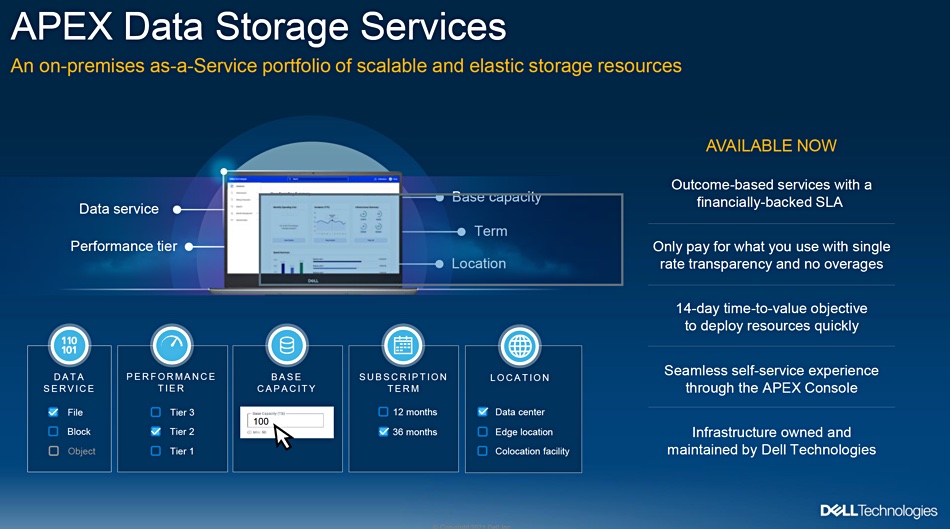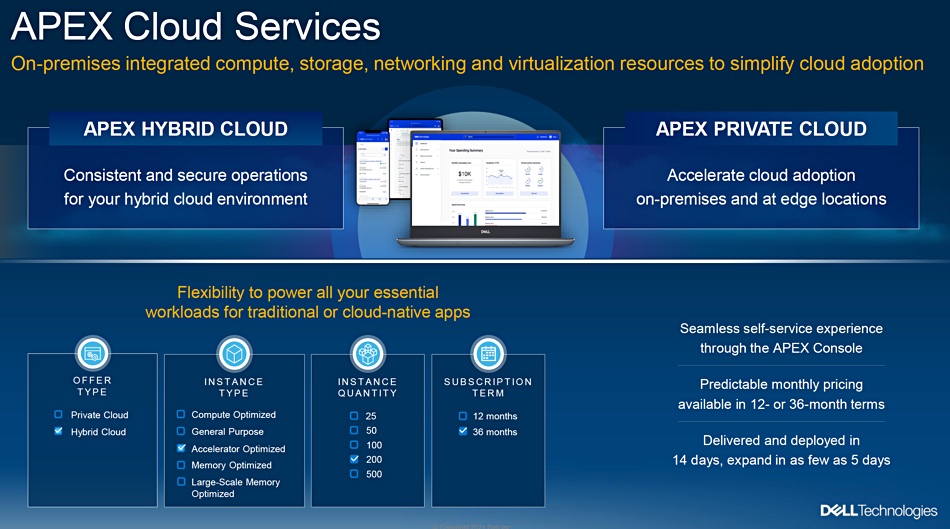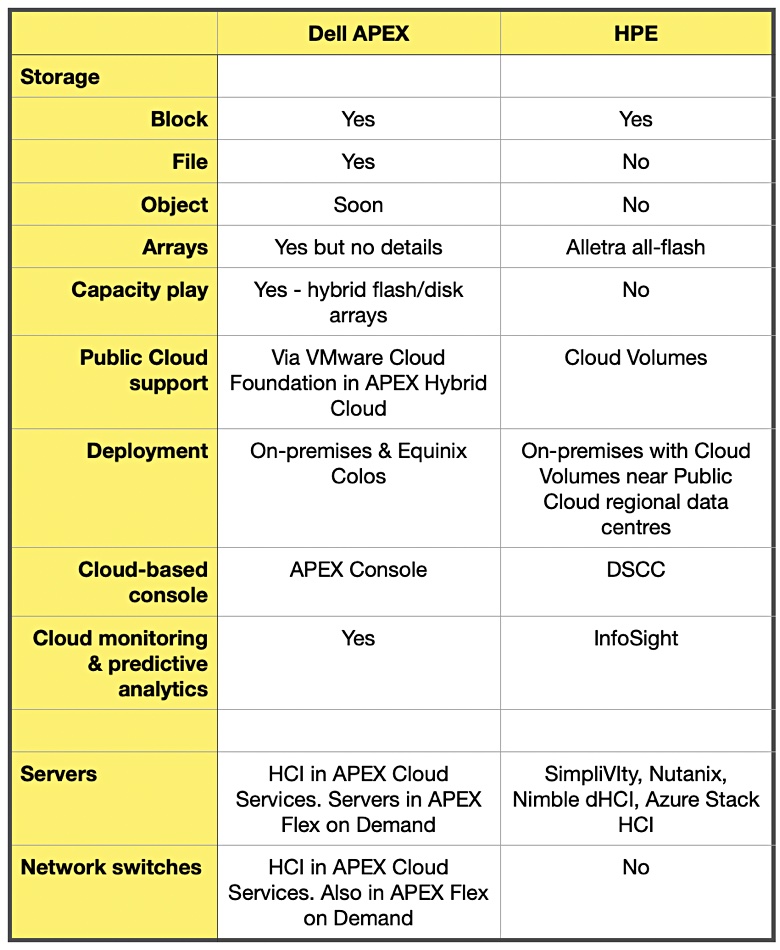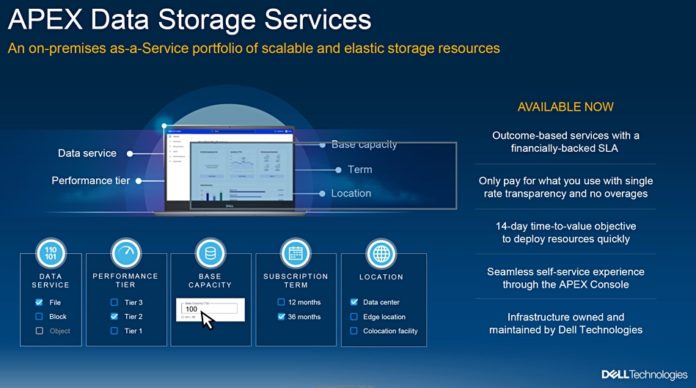Dell today unveiled its APEX Data Storage Services at its virtual Dell Technologies World event, claiming to offer a consistent service across edge locations, private and public clouds, with subscription pricing and a single online APEX Console access point.
Updated: 21 June 2021, to add HPE server information to the APEX-vs-GreenLake table.
There’s a storage SaaS battle unfolding between HPE, which announced yesterday, and Dell and its APEX equivalent, minus a few whistles and plus a few bells, today.
Allison Dew, EVP and CMO at Dell Technologies, trilled: “With the industry’s leading IT portfolio, decades of data centre services experience and an unmatched global supply chain and partner network, no other as-a-Service portfolio comes close to our capabilities.”
Project APEX is Dell’s effort to supply managed file and block storage as services and was revealed in October last year. It now also includes hyper-converged products, which are missing from HPE’s offer. As with HPE, Dell says APEX will cover edge, private and public cloud locations. It did not say which of its storage array and filer products are actually going to provide the storage services; PowerMax, PowerStore, PowerScale, PowerProtect, etc.
We think that PowerStore is used for block and PowerScale for file.
Dell says APEX has an outcomes-based approach, removing the need for customers to manage a particular product line, version of a technology or specification. They choose technology services with Dell and its partners architecting and managing the infrastructure, with deployment taking 14 days at minimum and with expansion needing as little as 5 days.
APEX Data Storage Services and console
APEX Data Storage Services, the first in Dell’s Infrastructure Services portfolio, provides customers with three performance tiers of block and file storage. Object storage will be coming soon. One- or three-year subscriptions are available, and capacity starts at 50TB and can scale up from there.

Akanksha Mehrotra, Dell’s VP for APEX, said in a briefing: “It provides our customers with self service access to the catalog of APEX services and [a] guide. … they can view all of their active subscriptions in multiple locations. … they can view billing on pending invoices or configure alerts when expansion might be trending.”
Customers use an online APEX console to identify and subscribe to services in a catalogue, and Dell matches the technology and services to deliver the desired outcomes. The Console then provides monitoring and management of the subscribed services, with usage and spending reports, status insights and predictive analytics to forestall problems.
The console has API access and, in the future, developers at Dell’s partners will be able to access the console’s functionality programmatically.
Dell-managed kit can be deployed on-premises or in Equinix colocation sites and there are associated APEX cloud services.
APEX Cloud Services
APEX includes Cloud Services, covering hybrid and private clouds and supplying integrated compute, storage and networking resources (hyper-converged infrastructure or HCI) with support for both traditional and cloud-native applications. Customers choose a hybrid or private cloud, an instance type such a general purpose or memory-optimised, instance number and subscription term.

There are also APEX Custom Solutions with Flex On Demand and Data Center Utility options. Flex On Demand provides Dell servers, storage, data protection, and hyperconverged infrastructure as-a-Service. The Data Center Utility adds custom metering and managed services applied across a customer’s data centre.
Sam Grocott, Dell’s SVP for Business Unit Marketing, said: “VMware is deeply embedded into our APEX offerings,” with the APEX hybrid and private cloud offers built on the jointly-engineered dell and VMware and VxRail product.
The APEX hybrid cloud uses VMware Cloud Foundation to move workloads on and off-premises to any cloud provider, such as AWS, Azure, Google, IBM, etc.
Grocott said there was “a very strong roadmap with APEX and VMware that we’re jointly working on today to deliver even more offers in the very soon future.”
Mehrotra said: “APEX cloud services are available today in the USA, UK, France, Germany and are coming soon to other geographies. … APEX custom solutions are available in 30 plus countries today, including 20 in North America and EMEA through both Dell, as well as our … partner community with both referral and retail options.”
Dell announced a streaming data platform offer for edge locations which involves PowerSCale and the ECS arrays to ingest data for both real-time and historical batch analysis. It’s also announcing manufacturing-focused services available through the APEX private Cloud.
Dell and Equinix
Customers’ APEX Console-originated and managed IT capabilities can be deployed at an Equinix International Business Exchange data centre. There are 220 of these around the globe and customers pay for what they use, with a single-rate and no overage fees. The equipment is owned, deployed, supported and billed on a single invoice from Dell Technologies. More details on the Dell APEX Equinix deal will come later this year.
Mehrotra said APEX represented a partner opportunity as it provides a “continuous engagement model opportunity [and] we expect partners to deliver and develop and deliver new solutions on top of APEX.” Also partners: “can host infrastructure workloads on behalf of their customers in a dedicated environment and build solutions on top of it.”
Pure Storage has a similar deal with Equinix for its customers, providing block, object and Pure’s Portworx Kubernetes storage services. It’s a hybrid cloud deal with connectivity to Pure’s Cloud Block Store and Portworx in the AWS, Azure and GCP public clouds. As of March 3 this was available in 18 Equinix data centres.
Dell APEX and HPE StaaS
At first glance Dell’s APEX services cover more storage protocols and more storage, HCI and server systems than HPE’s Data Services Platform, with HPE providing deeper console-storage array integration.
We have tabulated a basic comparison between the two companies’ announcements based on what we know so far:

HPE says more Data Services Platform announcements will follow in the next few months, so we are facing a rolling announcement race between Dell and HPE to build out their infrastructure-as-a-service offerings.
Neil Fleming, a senior manager at HPE’s HPE Cloud Data Services, tweeted: “Dell Apex reads more like HPE GreenLake central that we launched a few years ago (about managing consumption based contract and ordering of HCI, servers, storage and cloud from HPE) Data Services Cloud Console Is completely different to that.”
An HPE spokesperson said: ” HPE has already been delivering Storage-as-a-Service for years, allowing customers to unleash the power of their data wherever it resides. HPE recently took this to the next level with the unveiling of our Unified DataOps vision and launch of breakthrough innovations including Data Services Cloud Console and HPE Alletra, which together brings cloud operational agility to data, wherever it lives. Customers can now maximise agility and innovate faster than ever before with the cloud experience where their data lives.”








